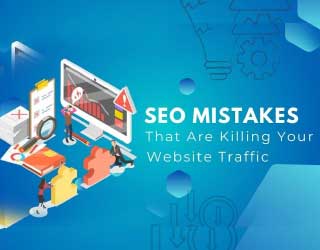Top 10 Website Mistakes That Can Kill Your Traffic in 2025 (And How to Fix Them)

Introduction:
In 2025, having a fast, reliable, and user-friendly website is more important than ever. But many site owners—especially small businesses—are unknowingly making critical mistakes that hurt their traffic, conversions, and search engine rankings. If your website isn’t performing well, chances are you’re falling into one (or more) of these traps.
Let’s break down the top 10 mistakes to avoid—and how to fix them using simple, actionable tips.
1. Slow Website Speed
Why it matters: A delay of just one second in page load time can reduce conversions by 7%.
How to fix it:
-
Use fast, SSD-powered hosting (like Host4Asia)
-
Compress images with tools like TinyPNG
-
Use a CDN (Content Delivery Network)
2. Not Mobile-Friendly
Why it matters: Over 60% of traffic comes from mobile in Asia.
How to fix it:
-
Use responsive design
-
Test your site with Google’s Mobile-Friendly Test
-
Avoid pop-ups and heavy elements on mobile
3. Poor Hosting Choice
Why it matters: Cheap, unreliable hosting can lead to downtimes and slow speeds, hurting SEO and user trust.
How to fix it:
-
Choose a hosting provider with 99.9% uptime and local data centers
-
Look for real customer support, not just bots
-
Use scalable hosting plans as you grow
4. No SSL Certificate (HTTPS)
Why it matters: Google flags HTTP sites as “Not Secure.”
How to fix it:
-
Install an SSL certificate (many hosts, including Host4Asia, offer it free)
-
Redirect all HTTP traffic to HTTPS
5. Ignoring SEO Basics
Why it matters: If you’re not showing up in search engines, your website is invisible.
How to fix it:
-
Use keyword-rich titles and meta descriptions
-
Submit your site to Google Search Console
-
Create high-quality, helpful content regularly
6. Using Generic Templates Without Branding
Why it matters: Your website should reflect your business, not look like thousands of others.
How to fix it:
-
Customize templates with your brand colors, fonts, and messaging
-
Use original images when possible
7. Not Having a Clear Call-to-Action (CTA)
Why it matters: Visitors won’t take action unless you guide them.
How to fix it:
-
Use strong CTAs like “Get a Quote,” “Start Free Trial,” or “Contact Us”
-
Place CTAs above the fold and throughout the page
8. Cluttered Navigation
Why it matters: Confused users leave.
How to fix it:
-
Keep menus simple and intuitive
-
Use clear labels and limit top-level items
-
Include a search bar
9. Lack of Website Backups
Why it matters: One error or hack can wipe out your site.
How to fix it:
-
Use automatic daily backups
-
Store backups on remote servers or cloud storage
10. Not Tracking Performance
Why it matters: You can’t improve what you don’t measure.
How to fix it:
-
Install Google Analytics 4
-
Use tools like Hotjar to see user behavior
-
Regularly review traffic, bounce rate, and conversions
Conclusion:
Your website is your digital storefront—and it needs regular care to perform well. If you’re making any of these mistakes, now’s the time to fix them. Need help? Host4Asia offers lightning-fast hosting, built-in security, and 24/7 support to keep your site running at its best.
Director
Sanjeev Chatkara
9891242803

What is Digital Marketing? Strategies, Tools & Trends in 2025
Understand how modern digital marketing strategies work to grow your brand in 2025
How Digital Marketing Works
Digital marketing uses digital channels like websites, search engines, and social media to connect with customers. It combines strategies such as SEO, PPC, content creation, and analytics to drive online growth.
Key Components of Digital Marketing in 2025
1. Define Goals and Audience
Clarify your marketing objectives and identify your target audience for effective campaign performance and personalization.
2. SEO and SEM
Optimize your site with SEO best practices and run PPC campaigns to increase visibility in search engine results and attract high-converting traffic.
3. Content Marketing
Create blog posts, videos, and guides that solve problems and provide value. High-quality content improves engagement and boosts SEO.
4. Social Media Marketing
Use platforms like Instagram, LinkedIn, and Facebook to engage with audiences, run ads, and increase brand awareness and loyalty.
5. Email Marketing
Build lists and send personalized, value-driven content to nurture leads and convert prospects with newsletters and promotions.
6. Influencer Marketing
Partner with niche influencers to reach targeted followers, boost credibility, and expand brand visibility across digital platforms.
7. Analytics and Optimization
Track KPIs with tools like Google Analytics, refine your strategy, and continuously improve campaign performance and ROI.
Why Digital Marketing Matters in 2025
In a highly competitive digital economy, effective online marketing is essential for lead generation, brand authority, and business growth.

Why Page Speed is So Important for Your Website and How You Can Improve It
Page speed is crucial for several reasons, impacting user experience, search engine rankings, mobile optimization, and conversion rates. Here are some of the main reasons why improving page speed is essential:
User Experience
Fast-loading pages provide a positive user experience. Users expect websites to load quickly, and delays can lead to higher bounce rates. A fast site engages visitors, improves interaction, and promotes satisfaction.
Search Engine Rankings
Search engines, particularly Google, prioritize fast-loading websites in their rankings. Faster websites are more likely to appear higher in search results, increasing organic traffic and visibility.
Mobile Optimization
With mobile-first indexing, having a fast mobile version of your site is essential. Mobile users often face slower internet connections, and a faster mobile site improves the user experience and mobile search rankings.
Conversion Rates
Page speed directly impacts conversion rates. Delays can result in higher bounce rates, reducing opportunities for sales, sign-ups, and form submissions. Fast-loading websites provide smoother, more effective conversion experiences.
Mobile-First Indexing
Google uses mobile-first indexing, so your mobile site’s page speed directly influences its SEO ranking. Ensuring a fast mobile experience is critical for retaining visitors and maintaining visibility on search engines.
Competitive Advantage
In a fast-paced digital landscape, users expect quick load times. A slow website can drive potential customers to competitors, so optimizing page speed gives you a crucial competitive edge.
How to Improve Your Website’s Page Speed
- Optimize images and media files for faster load times.
- Minimize and combine CSS, JavaScript, and HTML files.
- Leverage browser caching and use a Content Delivery Network (CDN).
- Choose a fast, reliable web hosting provider with scalability options.
- Use lazy loading for images and videos.
- Enable server-side compression and use GZIP.
Optimizing page speed is an investment that improves user experience, increases search engine rankings, and enhances conversion rates. Regularly monitor and optimize your website’s performance to stay competitive in the digital marketplace.
For more tips on website performance and SEO, follow our blog or contact us for professional advice.